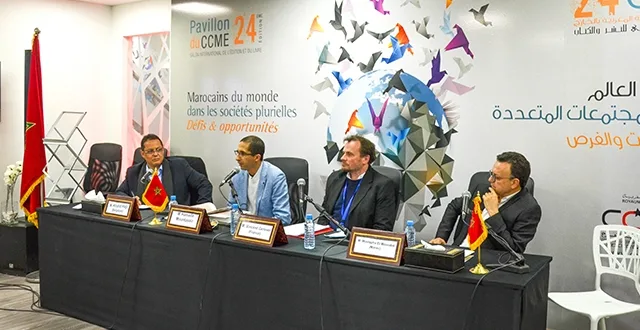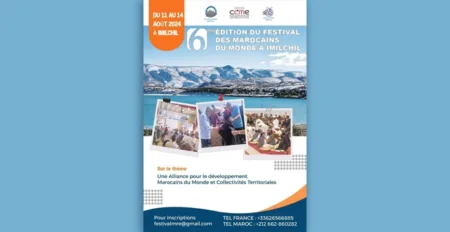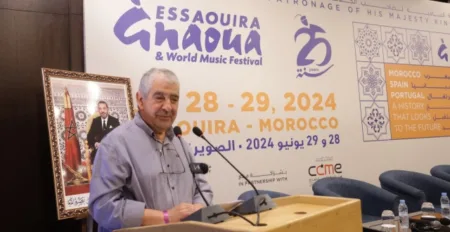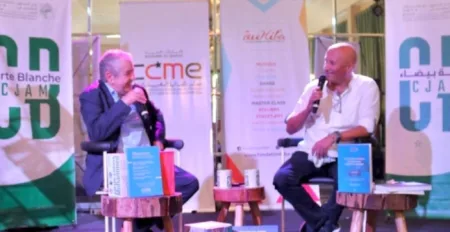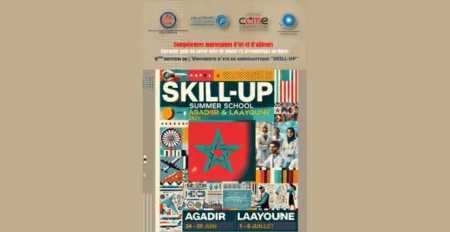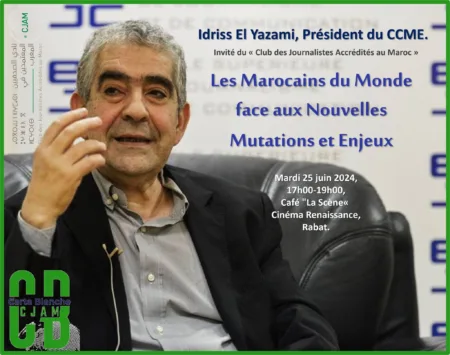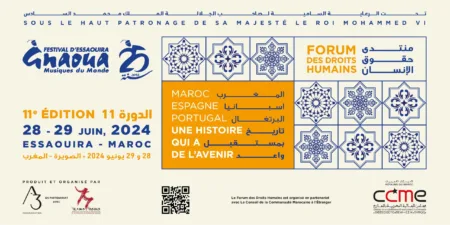The last meeting organized by the Council of the Moroccan community abroad at the book fair in Casablanca, during this edition of the year 2018 (18 february) dealt with the theme of mutual benefit and various readings of Moroccan migration in Europe.
Vincent Geisser (France), Khalid Hajji (Belgium), Mustapha El Mourabit (Morocco).
Mr. Vincent Geisser *
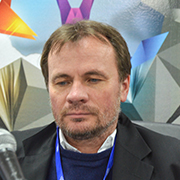 In his intervention Mr. Geisser spoke about the « socialogical mystery » of the link to t country of origin of the new generations of Moroccans living in Europe. He tried to undesrand the “sociological” mystery that makes young people of the 3rd or 4th generation feel proud of their Moroccanness despite the geographical distance. A “mystery” that for the sociologist can be understood trough the persistence of the transmission. A transmission of the family, but also to the evolution of Morocco, which he says has known how to “emerge”.
In his intervention Mr. Geisser spoke about the « socialogical mystery » of the link to t country of origin of the new generations of Moroccans living in Europe. He tried to undesrand the “sociological” mystery that makes young people of the 3rd or 4th generation feel proud of their Moroccanness despite the geographical distance. A “mystery” that for the sociologist can be understood trough the persistence of the transmission. A transmission of the family, but also to the evolution of Morocco, which he says has known how to “emerge”.
The sociologist believes that being Moroccan is different according to the individual and describes it as “a Moroccan à la carte”, namely chosen » or exclusive: “A mind map in which we will makea slection of elements of Morocco that can be very different. It is neither homogeneous, nor uniform, but composite », he said. He then “splitted this moroccanity in three stages:” heresy of bi-nationality, then of disantchantment (1980s-90s), he evoked what he called “the recaptured Moroccanness”, citing the example of those generations who feel “French and Moroccan”, ” the return of the Moroccan flag in the youth bedrooms “,” the identification with the national team. “Mr. Geisser rejects, moreover, the idea that this return to sources A contrario to the (poppulist) speeches that believe that this returning to the roots is the result of a social failure in host countries. To counteract such speeches he cites the example of the elite of Moroccan origin “those who succeed also have this desire to serve their country of origin”.
Mr. Khalid Hajji *
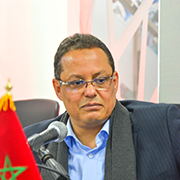 Mr. Hajji tried for his part to explain the idea of exchange by saying « we know what we give, but forget what we receive”. He relied on authors who understood that a civilization could not survive (NDLR without the terrestrial foods to quote André Gide). Quoting in particular Ibn Khaldoun who argued that when civilization gives and takes it emerges. While currently the most extremists are trying to nether the idea related to what we give and what we take. He also mentioned Goethe (the father of German Romanticism for whom cultural phenomena are part of the construction of world) by quoting his concept of “Wellitteratur”.
Mr. Hajji tried for his part to explain the idea of exchange by saying « we know what we give, but forget what we receive”. He relied on authors who understood that a civilization could not survive (NDLR without the terrestrial foods to quote André Gide). Quoting in particular Ibn Khaldoun who argued that when civilization gives and takes it emerges. While currently the most extremists are trying to nether the idea related to what we give and what we take. He also mentioned Goethe (the father of German Romanticism for whom cultural phenomena are part of the construction of world) by quoting his concept of “Wellitteratur”.
Mr. Hajji also reminded that immigration began as by being “a work force” and not an “intellectual force”. Quoting Edward Said and his memoirs (Out of Place), on one of the most interesting episodes of Edward Said’s outstanding book, who was a Christian palestinian and asked about the combination of his name and surname: Edward and Said. Mr. Hajji cited many works, from Brave New World (The Brave New World) to George Orwell, Sefrioui or Yasmina Khadra to explain this “extension of being”.
Mr. Mustapha El Mourabit *
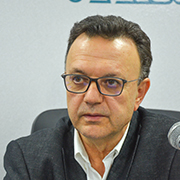 In his speech Mr. Mutapha Mourabit was mainly interested in the factor of « being », more specifically the human in general and the migrant in particular. An eminently scientific – and remarkable – approach to the complexity of the human being and in this case the migrant. He emphasized that studies taking the human factor into account are just beginning to emerge. For Mr. Mourabit, it is assumed that the human being is supposed to have understood « duality » : when we understand each other, it obligeses us to make a choice: the will, the culture and the origins.
In his speech Mr. Mutapha Mourabit was mainly interested in the factor of « being », more specifically the human in general and the migrant in particular. An eminently scientific – and remarkable – approach to the complexity of the human being and in this case the migrant. He emphasized that studies taking the human factor into account are just beginning to emerge. For Mr. Mourabit, it is assumed that the human being is supposed to have understood « duality » : when we understand each other, it obligeses us to make a choice: the will, the culture and the origins.
Each “Self”(individual) has its “Other” conceived through the other.
In other words, the discovery of “Self” is through the “Other” and therefore its reconstruction is done according to the “Other”. The distinction of this discovery and reconstruction between the “Self” (Arab-Muslim) and the “Self” (European) is that in the first case it is “positive” because its seen as a discovery and reconstruction is done through “what it does not have”, therefore, by an impression of « mechanical » comparison, it distiguishes “what it does not have” and that the Other has “as a lack. More specifically, one can declare a “sign of inferiority in the sense of acquiring “what it does not have”.
While the enterprise of “Self” (European), although it considers itself to the Other “(Arab-Muslim) through” what it does not have “, it is sometimes disqualifies it, since “what it does not have” and that the “Other” has” is perceived through the prism of a certain form of “decadence”. Whereas “the other is in the culture of avoidance (évitement) and « here » in the culture of the « inferiority complex”.
M.Vincent Geisser* Sociologist and political scientist. Researcher at the French Institute of the Near East (IFPO) of Beirut. Since 2005 he has also chaired the Center for Information and Studies on International Migration (CIEMI) in Paris. He is editor of the journal Migrations Société and member of the editorial board of L’Année du Maghreb. Among his many books La Nouvelle Islamophobie, Editions La Découverte, 2003; Marianne and Allah; French politics facing the “Muslim question”, with Aziz Zemouri, editions La Découverte, 2008. The authoritarian syndrome; Politics in Tunisia from Bourguiba to Ben Ali, with Michel Camai, Presses de Sciences Po, 2003; Arab rebirths: Seven questions about revolutions in progress, with Michaël Béchir-Ayari, Editions de l’Atelier, 2011 and Dictateurs en susis. The revenge of the Arab peoples; with Moncef Marzouki, editions of L’Atelier, 2009 and reprinted in 2012)
M.Khalid Hajji*
Doctorate of Paris-Sorbonne, professor-researcher in the Department of Anglo-American Studies and founding member of the Research Group Science and Culture in Paris Mohammed I University, Oujda. He is a founding member of the Circle of Wisdom for Thinkers and Researchers, and the Maghareb Center (Rabat). He is Secretary General of the European Council of Moroccan Ulema (CEOM) in Brussels. Among his publications Lawrence of Arabia or Arabia Lawrence, Harmattan; Modernity and Arab-Muslim creativity, Arab and Abderrahmane Cultural Center and the Sea, a novel published by the Arab Cultural Center.
M.Mustapha El Mourabit* Researcher teacher. Mustapha El Mourabit taught at the Faculty of Medicine of Louis Pasteur University in Strasbourg and at the Mohamed Premier University of Oujda in Morocco. Former director of Aljazeera center for studies in Doha, Qatar. He directed and hosted the program Oumsya maghribiya, broadcast on “Aljazeera mubasher”. He is a founding member of the Circle of Wisdom for thinkers and researchers in Rabat, he is also a member of several advisory committees of studies and research or journals, both abroad and in Morocco. He is currently a member of the CCME. He is president of the Maghreb Center for Studies.




